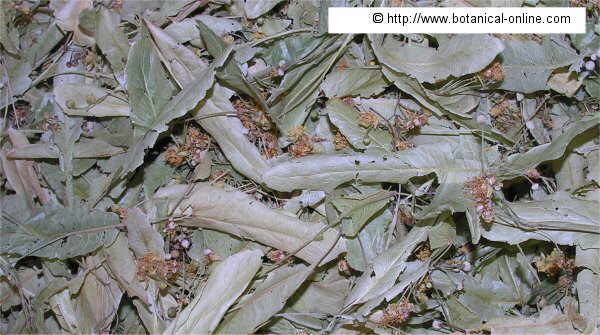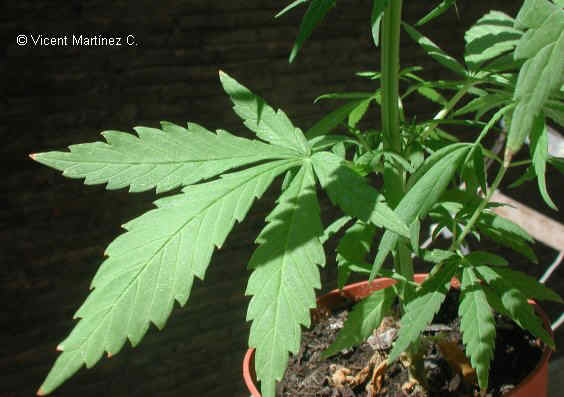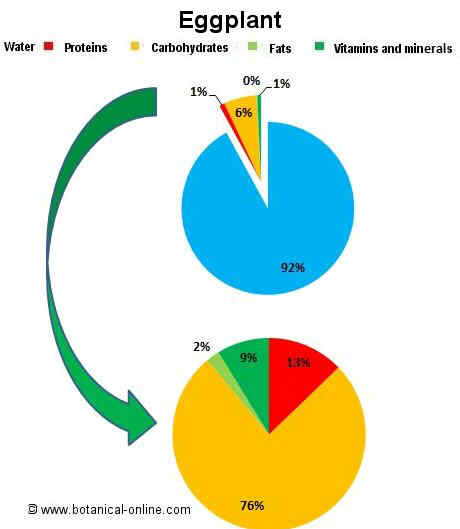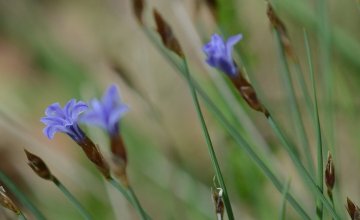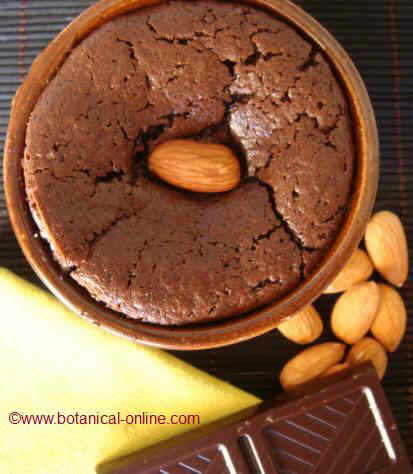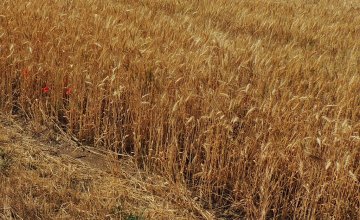Contents
- 1 Edible properties of pistachios
- 1.1 WHAT ARE THE MAIN NUTRITIONAL PROPERTIES OF PISTACHIOS
- 1.2 Potassium of pistachios favors the elimination of liquids
- 1.3 Pistachios contain a lot of magnesium
- 1.4 Although pistachio contains calcium, it is a decalcifying food
- 1.5 Pistachio iron helps prevent anemia
- 1.6 Other minerals that pistachios give us
- 1.7 Among all nuts, pistachios are a very important source of vitamins
- 1.8 Pistachios are a source of phytochemicals
- 1.9 Applications of pistachios
- 1.10 Medicinal properties attributed to pistachios
Edible properties of pistachios
WHAT ARE THE MAIN NUTRITIONAL PROPERTIES OF PISTACHIOS
Potassium of pistachios favors the elimination of liquids
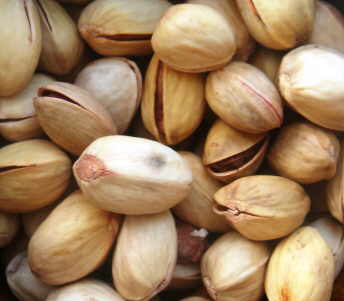
Pistachios, like all nuts, have little water and nutrient content is highly concentrated. This means that they are food with plenty of nutrients in a very small amount or volume.
Pistachios contain a large amount of potassium, with values reaching 70% of the recommended daily requirements. This mineral is an electrolyte that helps maintain proper nerve transmission, a correct contraction of muscles such as the heart, and the regulation of blood pressure.
We must bear in mind that, if we compare the levels of potassium of pistachios with that of bananas, a serving of pistachios (20 g or 20 units) provide the same potassium amount than half a little banana.
Whereupon, we can easily meet our needs and get all the benefits, such as promoting cardiovascular health, protect against hypertension by regulating blood pressure, and also atherosclerosis.
In addition, they will have a great diuretic effect, contrary to fluid retention because they regulate the removal of fluids from our body. This action is done because they contain little sodium and a lot of potassium
Pistachios contain a lot of magnesium
Pistachios provide high levels of magnesium. In 100g of pistachios there is close to 35% of the recommended daily amounts of this mineral
Magnesium is very important because it helps relax, therefore it contributes to combat stress, anxiety, nervousness, irritability, etc.
It helps in muscle contraction-decontraction; to sleep better and to rest.
Magnesium has other important properties: it exerts a basifying effect to our body, interferes with the synthesis of some hormones, helps transform the essential fatty acids like omega-3 (Docosahexaenoic acid (DHA) is an essential fatty acid for proper brain function and to maintained in proper condition the retina of the eye).
Although pistachio contains calcium, it is a decalcifying food
A descalcifying food removes calcium from our bones or our teeth
Pistachio has a good calcium content, which covers 10% of our needs with an intake of 100g of pistachios.
Although, this mineral helps maintain strong bones and teeth, preventing the onset of osteoporosis. However, as the phosphorus content in pistachio is greater than its calcium content, the ratio of phosphorus and calcium is descalcifying.
Specifically, its phosphorus content is 5 times higher, so the relationship between them has a value of 0.21, far from being acceptable considered calcifying (with a relation between them of 0.7 or 0.8) (See descalcifying diet)
If we take into account the needs of phosphorus, 100g of pistachios have almost 90% of the recommended daily allowance of this mineral, which maintains the proper functioning of the central nervous system, its connections between neurons, etc. and improves both physical and mental endurance.
Pistachio iron helps prevent anemia
Pistachios have an iron content covering 44% of their daily needs, but we must consider that plant food iron is less bioavailable that meat iron and it is absorbed in very low amounts.
However, it is a way to supplement and change our diet in a very healthy way. Obviously, if there is iron deficiency, we will preferently consume other foods richer in iron of having it more bioavailable, as soon as possible to alleviate the consequences that can and cause an iron deficiency anemia.
Other minerals that pistachios give us
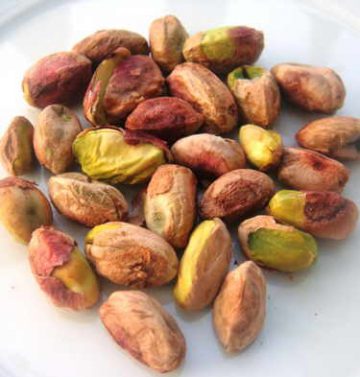
They are very rich in copper, as a serving of 20 grams or 20 units, covers almost 25% of the requirements.
Pistachios are also considered a nut that has a lot of manganese because 20 pistachios contain up to 60% of daily needs required. Together with vitamin B2, these two minerals help energy production and help prevent the effects of free radicals produced inside our body.
Other minerals with antioxidant effects are zinc and selenium 100 g of pistachios contain 23% and 13% of the recommended daily requirements, respectively. Both minerals help combat the effects of free radicals, help prevent cardiovascular disease and some cancers.
We must not forget that selenium protects vision against oxidation preventing the onset of eye problems such as cataracts, loss of vision or night blindness.
Among all nuts, pistachios are a very important source of vitamins
Pistachios do not only contain minerals with beneficial effects, they also contain vitamins and other important nutrients, with remarkable and salutary effects for our body
Pistachios contain many vitamins, with different effects:
- B vitamins
It specially contains vitamin B12 (cobalamin) for the brain and nervous system, but it also has:
– Thiamin (vitamin B1), which is involved in the metabolism of carbohydrates, providing energy (100g of pistachios contribute up to 50% of the recommended daily amount)
– Pyridoxine (vitamin B6), which is involved in amino acid metabolism and in the production of niacin (vitamin B3). 100 g of pistachios exceed the recommended daily needs.
– Folic acid (vitamin B9) 100g of pistachios contain the 25% of the recommended daily amount, necessary for the formation of structural proteins and blood hemoglobin. A deficit of this vitamin can lead to an increased risk of cardiovascular disease, among many other possible negative affectations to our health.
- Vitamin E
It has a good content of vitamin E in the form of tocopherol, with a minimum value of 10%, but may reach levels close to 50% of the recommended daily requirements with 100g of pistachios.
This vitamin has antioxidant effect against free radicals, which can help generate some diseases such as cardiovascular disease, but it also has effect against premature aging of skin cells and tissues.
- Vitamin A
A serving of pistachios contains 15% of the recommended daily requirement of vitamin A, which helps the regeneration of the mucous membranes and tissues of our body, to maintain a correct state of vision, mainly that of the retina.
- Vitamin C
100g of pistachios more than 10% of the recommended daily requirements of vitamin C, which has beneficial effect on our body giving us its antioxidant effect, helps our defenses, its healing effect, etc.
- Vitamin A
Pistachios are considered very rich in vitamin C and vitamin A, when compared to other nuts, because usually nuts contain little vitamin A and VitaminC.
Pistachios are a source of phytochemicals
They contain more phytosterols and lutein that all nuts, therefore, its effects and benefits are also higher. Because of its content in phytosterols (280mg / 100g), they prevent cardiovascular disease and some cancers.
Because they contain a powerful substance called lutein, an antioxidant, they can keep our eye health in good condition.
This substance is a phytochemical, which is not considered an essential nutrient, but it prevents cardiovascular disease, hypertension and cancer for its effect against toxins and carcinogens, because of its antioxidant effect that neutralizes free radicals and prevents LDL cholesterol oxidation.
It also contains a substance called resveratrol, another phytochemical, which is also found in red wine, also with preventive effects against cardiovascular disease and cancer.
It contains an amino acid called arginine, with vasodilator effect on the veins and arteries of the body. It facilitates blood flow to all the cells of our body. Ideal not only to prevent circulatory problems, being helpful in people who have difficult movements, swollen legs or feeling of heaviness and fatigue.
This amino acid intake should be controlled in people who have herpes simplex, since it can favor it appearance.
Applications of pistachios
A putty, obtained from the gum resin, is commonly used as a chewing gum, with applications ranging from clotting, to preventing oral problems.
The wood of the tree is of good quality and it is often used for making cooking utensils or even some furniture.
The shells are crushed and used to make compost, to fertilize the soil. They are also used as a dye in some areas of India.
Medicinal properties attributed to pistachios
Pistachio leaves are attributed with properties to improve fertility.
Instead, their fruits, are attributed with stimulant properties.
![]() More information on pistachios.
More information on pistachios.

